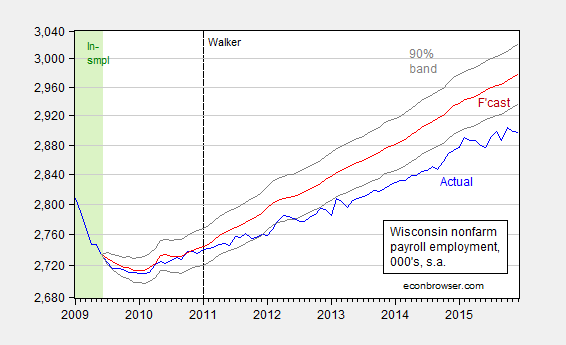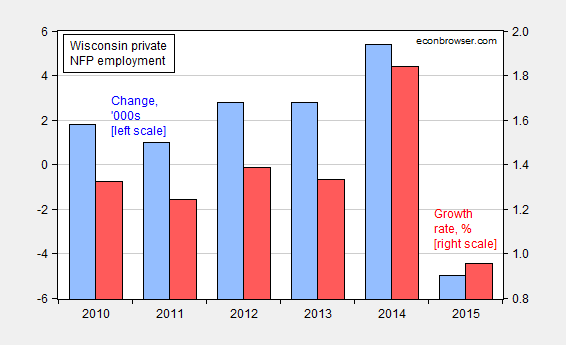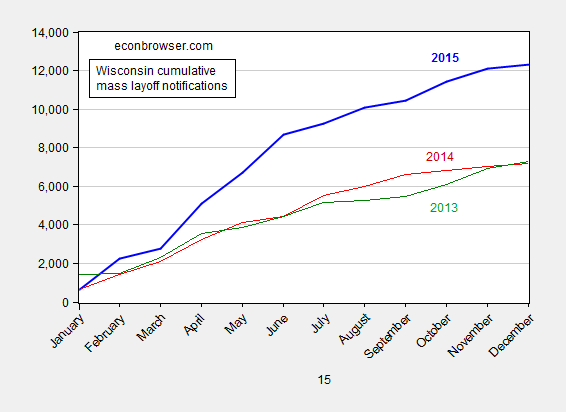That’s the first line of an op-ed published Monday. In other news, Wisconsin nonfarm payroll employment (NFP) and private nonfarm payroll employment is decreasing. And NFP lagging what should be the case if the historical correlation between national and Wisconsin employment held, after Governor Walker’s inauguration.
Figure 1: Wisconsin nonfarm payroll employment (blue), forecast from error correction model estimated over 1990M03-2009M06 (red), and 90% confidence band (gray lines), all on log scale. Dashed line at 2011M01 when Walker takes office, and light green denotes sample period. Source: BLS, author’s estimates (as described here).
2015 was the year that witnessed the slowest increase in private NFP employment, and the slowest growth rate, since the end of the last recession.
Figure 2: Wisconsin private NFP growth, in levels, 000’s (blue bar, left scale), and percent (red bar, right scale). Source: BLS, DWD, author’s calculations.
And 2015 was the year in which mass layoff notifications jumped.
Figure 3: Wisconsin cumulative mass layoff notifications by end-month, for 2015 (bold blue), 2014 (red) and 2013 (green). Source: DWD and author’s calculations.
Makes one wonder what it looks like when the state of the state is weak.



These lunatics are why Trump is winning.
http://vidmax.com/video/133348-Wisconsin-Democrat-Gwen-Moore-says-stopping-fraud-in-the-welfare-program-is-racist
6 years ago Walker and his fans that troll you on this blog promised that Scott Walker’s tax, anti-union, and deregulation policies would unleash dynamic economic growth in the State, much as Sam Brownback promised in Kansas and Bobbie Jindal in Virginia, etc. (I won’t add Paul LePage to this list since I don’t think he ever promised dynamic economic growth; rather he promised to be as mean as hell toward Democrats and poor people in Maine and he has kept that promise; if Scott Walker had just promised to the same thing, I would have to say he have kept those promises; but in fact prior to his elections Scott promised that he would not change public employees collective bargaining rights or make Wisconsin and Right to Work State or abolish the Wisconsin state employee civil service system. He decided to be as mean as hell after he was elected and fool the 5% of the Wisconsin population make a festish of “Fiscal responsibility,” but don’t like mean politicians.
One will have to say we are still waiting for that particular ship laissez-faire to come in for Wisconsin. It’s economic problems and stagnation are really beyond the Governor’s and local legislature’s control. They go back to a lot of issues, the biggest one being, as Noah Smith writes in Bloomberg, is the devastating consequences of China’s admission to the WTO to the Wisconsin manufacturing economy. Scott’s biggest skill in Wisconsin was to get all those frustrated, angry people in Milwaukee’s collar counties to kick down at “those People” rather than the Johnsons, Menards, Kochs, etc. of plutocracy who have made tons on money on buying from China and shifting plants and jobs to that country.
Although making your State an education backwater is probably not a way to attract new knowledge industry and start ups to your state. Also, apparently making a bet on turning Wisconsin into a low wage, mining state to produce Iron ore and copper for China for corporations controlled by the Kochs and other crony capitalist buddies of Scott turned out to be a bad bet. http://www.mining.com/iron-ore-company-shelves-plans-for-wisconsin-mine/
Scott and his fellow Movement Conservative Republicans looked to Louisiana, Mississippi, Alabama, and West Virgina as their economic models. Given the economic, social, and environmental catastrophes in those 4 states, under first Bourbon Southern Democrats and then Movement Conservative Republicans (usually the sons and daughters of the Bourbon Democrats), adopting this vision was certainly a triumph of hope over experience.
LOL I believe Wisconsin was within 2 points of the top state for average ACT score. It has an incredible university system, and the Walker cuts are not going to gut those fine institutions. It’s laughable to say Wisconsin is or will be an “educational backwater.”
Give him time. I moved out of Madison because of what the State cuts were doing there. Now the same problems are popping up here. In two years I’ll be taking my high-tech education and going where the standard of living is rising, not falling. I am thinking the Oregon or Washington.
P.S. I am not kidding and I am not the only one.
The strong dollar is killing Wisconsin.
Sherparick, the South lost the Civil War and lagged in the Industrial Revolution. To test political effectiveness, it would be more accurate to compare counties, controlling for influential variables, throughout the U.S..
Also, offshoring and the Law of Comparative Advantage benefited the country tremendously. Unfortunately, too many anti-growth policies slowed the expansion of the economy.
Moreover, American businesses created tremendous value for the masses. We need more successful entrepreneurs. And, we need capitalism based on a meritocracy, not crony-capitalism, that exclusively exchange favors with political class.
As to the effect of China on the manufacturing economy of the United States, I refer you to Noah Smith and Megan McArdle in Bloomberg:
http://www.bloombergview.com/articles/2016-01-28/china-trade-shock-for-u-s-workers-was-avoidable and http://www.bloombergview.com/articles/2016-01-27/don-t-blame-americans-for-blaming-china
That it is widespread, and effects a great deal of the United States, red state or blue, is seen here. http://www.pewtrusts.org/en/research-and-analysis/blogs/stateline/2016/01/22/fewer-manufacturing-jobs-housing-bust-haunt-many-us-counties I note that this green counties, indicating increase incomes, are in the states that benefited greatly from the fracking boom, from North Dakota down to Texas and that this chart was done in 2014. It will be interesting to see how incomes hold up in these states and counties post oil bust.
Again, your response is an example of “Conservatism cannot fail, it can only be failed” since the administration you apparently say “over regulated the economy” was the George W. Bush administration and its Republican majorities of 2001-2007.
By the way, South went into relative economic decline before the Civil War in order to maintain slavery and the oligarchy that had come to rule it. http://www.amazon.com/Dominion-Memories-Jefferson-Madison-Virginia/dp/0465003567 After the Civil War, the post-reconstruction Governments of Jim Crow repealed the progressive legislation of reconstruction and the lawlessness of Jim Crow one party rule to keep African American population in a subordinate position and discourage industrialization. http://www.nytimes.com/2015/03/29/opinion/sunday/why-reconstruction-matters.html
Sherparick, the U.S. benefited tremendously offshoring older industries, with declining prices, and shifting limited resources into high-end manufacturing and emerging industries with market power. Moreover, the U.S. benefited by exchanging worth less dollars for valuable goods. Unfortunately, more progressive taxes on the middle class and excessive regulations slowed domestic growth.
Also, there are many more variables that influence living standards than oil production.
The country was at full employment when the economy peaked in 2007. The 2001-07 expansion was on top of a huge economic boom in 1982-00 and on top of a mild recession in 2001. The country has been in depression, since the recession ended in 2009. You can’t blame Bush for that, although some people try.
At least, you don’t disagree with my statement about the South losing the Civil War and lagging in the Industrial Revolution.
“Unfortunately, more progressive taxes on the middle class and excessive regulations slowed domestic growth.”
we had lower taxes, especially on the upper class, and deregulation in the “bush expansion” from 2001-2007. remind me again of what that led to? financial crisis and depression like economy. these are the pro growth policies you would like to implement again?
You don’t want politicians facilitating a boom and then facilitating a bust at the exact wrong times. Let economists handle it rather than lawyers.
With the exception of the Milwaukee area, most of the key locations in Wisconsin are showing unemployment below 4%. http://www.bls.gov/regions/midwest/wisconsin.htm Minneapolis/St. Paul is less than 3% while Madison is about 3%… pretty similar for capital cities with major universities.
What’s the problem with Milwaukee? Bad governance? I noticed that it is in the top ten U.S. cities for violent crime. http://www.wisn.com/news/report-lists-milwaukee-in-top-10-most-dangerous-cities/35876036 This could be a problem for economic growth. People are not attracted to areas with high crime; Detroit is an excellent example of that. Great effort has been made to make downtown and midtown safer with a resulting influx of people and jobs. With Wisconsin-Milwaukee and Marquette U, the city should be magnet for growth. Perhaps new government is necessary.
It would seem that a concentrated effort needs to be made in Milwaukee county to bring it up to the rest of the state in economic recovery.
Odd case this “Milwaukee.” I guess since they are failing so bad Milwaukee must have been run by Republicans for decades right?
Per the BLS, Milwaukee’s unemployment rate is 4.4%, equal to the rate in Janesville, and less than that of Racine (4.9%) or the U.S. (5.0%). I think the real issue is that Wisconsin is a Northern state not situated on the West Coast. Short of discovering oil, growth is going to be steady at best. Of the aforementioned group of states, the ones that seem to be performing relatively well post-recession (New York, Minnesota, Massachusetts) are home to large, singular, thriving metropolitan areas that constitute their respective state’s economic/educational/political/cultural epicenter.
As a manufacture in the state I have seen solid progress in the environment here. I think the reality is that states and cities can make things noticabliy worse then average. Once the local governmen
How can Wisconsin’s state of the state be strong when the the nonpartisan Legislative Fiscal Bureau revenue report that showed Wisconsin is expected to take in $158 million less in revenue? http://docs.legis.wisconsin.gov/misc/lfb/revenue_estimates/140_january_21_2016.pdf
The lower revenue projection was attributed to lower than expected income tax revenue due to falling wage growth in the state.
Of course, “$158 million less” is merely less than the prior estimate, not less than the actual from the prior period. From period to period, they estimate an increase in revenues of almost $500 million. Does that mean the state of the economy is not “strong” or merely that in the future it is not expected to be as strong as earlier thought?
And, if you had read carefully and without ideological blinders on, you would have informed us here that the estimate was lowered primarily due to revised lower estimates for the *national* economy, federal changes in tax law, etc. and not factors unique to the state. Per the Prez in the last SOTU address: “Anyone who says our economy is in decline is peddling fiction”. Read the whole thing.